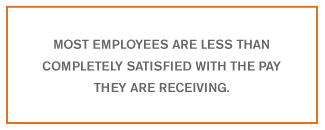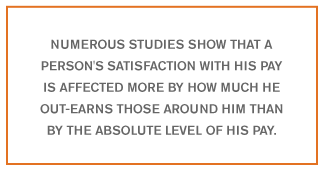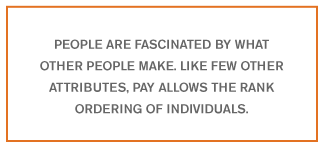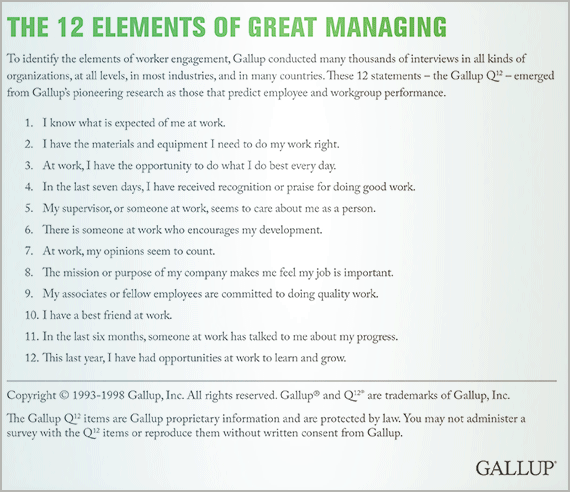Should anyone have needed proof that the topic of pay induces intense emotions, the Italian government provided it on April 30. For a few hours on that date, Italians were treated to a chance to retrieve online the tax returns of all 40 million of their fellow citizens who paid taxes in 2005. The access was a parting gift from the outgoing government of Prime Minister Romano Prodi. Posting everyone's income was a "simple matter of transparency and democracy," said the departing deputy economy minister who authorized the move.
 |
Italians reacted with a combination of horror that their own data were revealed and eagerness to know what the rich, the famous, and the neighbors were earning -- or at least saying they were earning in a system known for rampant tax evasion. The website was clogged with the curious before public outrage shut it down.
Two years earlier, British newspaper columnist Polly Toynbee touched the same live wire when she advocated making all pay public. "People do know more or less what everyone else earns in the public sector, so why not make it compulsory for all?" she argued.
Norway and Finland make tax returns public, she observed. Toynbee cited research finding that fairness and "transparency" are more important than the actual amount of one's salary, so why not -- as the column's headline said -- "Throw open the books so that we can see what everyone earns." "After the initial shock," she assured her readers, "people would soon get used to the idea."
The day the piece appeared, a blogger wrote to the columnist, asking, "How much do you earn per annum?" She refused to answer the question. "An organisation has to go public all together."
In ways they may not have intended, the Italian government and the British columnist made a crucial point: Pay is complicated. In fact, pay is so thorny that it behaves like none of the 12 Elements of Great Managing, the dozen aspects of the work environment that Gallup's research showed are most important to measure and improve. (See sidebar "The Twelve Elements of Great Managing.")
Companies frequently ask why Gallup does not include a compensation statement in its Q12 employee engagement assessment. The answer is that while an employee's response to each of the 12 Elements predicts how he will perform in the future, his answer to a pay question is so bundled up in psychological complexities that asking it usually causes more problems than it solves. Pay is a status-laden, envy-inspiring, politically charged monster. Getting it right is crucial, and that begins by not underestimating its hazards or lumping it in with other aspects of an engaging workplace.
In its irrationality, pay is like many of the 12 Elements -- ideas that seem logical on the surface, yet are both surprising and exceptionally complex when processed through the human mind. But compensation is much messier than any of the 12 Elements. A number of basic truths about the psychology of pay demonstrate why managers must view their compensation strategies through an emotional lens if they want to maximize how well they motivate workers:
Higher pay does not guarantee greater engagement.
A supervisor might assume going in that the more she pays her team, the happier they will be. But there's a lot of truth to the old saying that "Money doesn't buy happiness." It doesn't necessarily buy engagement either.
One of the sociological puzzles that presented itself in the last few decades is why, if people spend so much of their energy in pursuit of higher incomes, the attainment doesn't bring the hoped-for result. "Increases in our stocks of material goods produce virtually no measurable gains in our psychological or physical well-being. Bigger houses and faster cars, it seems, don't make us any happier," wrote Robert H. Frank in his book Luxury Fever: Why Money Fails to Satisfy in an Era of Excess.
Five leading researchers writing in the journal Science concluded: "The belief that high income is associated with good mood is widespread but mostly illusory. People with above-average income are relatively satisfied with their lives but are barely happier than others in moment-to-moment experience, tend to be more tense, and do not spend more time in particularly enjoyable activities."
Good and bad employees are equally likely to think they deserve a raise.
Most employees are less than completely satisfied with the pay they are receiving. This should not come as a shock, given people's desire to progress, ability to find things to buy, and awareness of their every sacrifice for their employers. But the real fly in the ointment is that when asked a pay question, the worst performers are not very objective. They are just as likely as the best employees to say they should be paid more. At one company, when employees were allowed to set their own salaries, "it was a disaster: the good workers set them far too low, and the bad ones set them far too high," wrote the company's chief executive.
 |
In posing any question to its associates, a company sets up an expectation that it will do something about the results -- an expectation that can backfire if the issue is not addressed. If you ask a friend if he'd like to go to the baseball game with you, he's likely to not just say, "Yes," but also, "When do we leave?" If you ask if someone is happy with her pay, she will likely not just say, "No," but also, "Where's my raise?" Although some employees in almost any company "deserve" an increase in pay, asking every employee his opinion neither identifies who should get a raise nor gives any useful information to company leaders.
Some incentives can backfire, decreasing employee motivation.
When companies slice incentives into too many small pieces, they have the opposite of their intended effect. Paying for a small act communicates to the worker: "You wouldn't normally want to do this, so we're going to pay you to do it." While logically the reward should be a further inducement, it instead decreases motivation. What is meant as a bonus the mind unconsciously takes as a bribe. (See "Fixing a 'Sneaky Broke' Hotel" in the "See Also" area on this page.)
"When people are rewarded for doing an interesting activity, they are likely to attribute their behavior to the reward and thus discount their interest in the activity," wrote professors Edward L. Deci, Richard Koestner, and Richard M. Ryan after analyzing 128 studies of how rewards influence behavior.
When children are asked to collect money for a charity, those who receive a higher reward do, in fact, collect more than those who are offered a smaller incentive. But children whose only inducement is the knowledge they are doing something good for someone else collect more than either the high- or low-reward groups.
If a small payment is given to induce more blood donations, the number of people who show up at the blood bank is less than if there is no payment at all. "The stipend turned a noble act of charity into a painful way to make a few dollars, and it wasn't worth it," wrote Steven Levitt and Stephen Dubner in their book Freakonomics. In the scientists' terminology, the piecemeal rewards "crowd out" the "intrinsic motivation" of the task itself.
Sales commissions and piecework pay are sometimes the best ways to hold people accountable. Pay-for-performance tactics can help keep workers' eyes on the goal and can even build engagement. But when used as a catch-all strategy, paying for doing can just as often backfire.
Pay is more about status than about paying the bills.
Numerous studies show that a person's satisfaction with his pay is affected more by how much he out-earns those around him than by the absolute level of his pay. Assuming the purchasing power of a dollar is the same in the following two situations, which would you prefer? (A) Your yearly income is $50,000, while others earn $25,000 or (B) Your annual income is $100,000, while others earn $200,000? Given that choice, half the people will choose a lower absolute salary that puts them at the top of the heap.
Columnist Toynbee argued that shining light on everyone's salary would lead to greater equality, "trust and social glue." Several pieces of evidence suggest just the opposite. Publicly traded companies in the United States are already required to report the compensation of their CEOs and the four other highest paid executives in the business. It may be that executive compensation has grown incredibly fast not in spite of the disclosures, but because of them, as corporate leaders fought for position on published lists of the highly compensated.
If the goal of disclosures is restraint of executive pay, "history is not promising," wrote columnist Floyd Norris in The New York Times. "The rise in executive pay began after more disclosure was required and bosses could see what others were getting. Their standard of comparison went from what others in the company were getting to what other bosses got. And every boss deemed himself above average."
Pay comparisons among employees spark intense emotions.
People are fascinated by what other people make. Like few other attributes, pay allows the rank ordering of individuals, an unvarnished display of where each stands in the hierarchy. Lists of moneymakers, whether Forbes' compilation of the richest people in the world or a local newspaper's list of CEO pay in the market, are always splashed on the cover.
 |
Once a year, Parade magazine, the Sunday insert in many U.S. newspapers, publishes a special issue headlined "What People Earn." It shows a sampling of salaries from stars and political leaders to everyday workers, a little financial voyeurism into data usually considered impolite or taboo at a lesser distance. One of the attractions of Parade's version is that, in finding the salaries of ordinary Joes and Janes, the reader can see who makes more or less than he does. It's one of the publication's best-read issues.
When the comparisons are closer to home, such lists change from fascinating reading to potentially explosive information. The Wall Street Journal told the story of one woman who found on the office copier a document containing the performance ratings, base compensation, raises, and bonuses for 80 of her colleagues. She was "outraged that a noted screw-up was making $65,000 a year more than more competent colleagues, while some new hires were earning almost $200,000 more than their counterparts with more experience," said the story. "The discovery led her to question why she was working weekends for less pay than others were getting. 'I just couldn't stand the inequity of it,' she said. Three months later she quit."
While individual pay usually should not be public, compensation criteria should be.
Individual pay is usually best kept confidential, but common knowledge of established salary criteria is important to feelings of fairness. Workers need to know, as one study found, "how pay plan goals are established, the pay plan goals themselves, how the plan goals are evaluated, and how the payouts are determined." Only from such widely understood information can the workgroup have a belief in what social scientists call the "procedural and distributive justice" of the system. Without it, the organization is exposed to perceptions of favoritism, opportunism, or discrimination.
A hypothetical Harvard Business Review case study lists several of the disparities that can creep in over time: the new hires lured in with more money than veterans make, substantial salary differences between departments, and the higher salaries better negotiators gain over those who agitate less, to name a few. In the entertaining case study, a computer-savvy employee decides to punctuate her departure by e-mailing the salary file to the entire company, creating predictable angst.
The question for decision makers is how large of a riot would be sparked if all pay were public. If a company can honestly say that based on a common knowledge of how it calculates pay, most employees would not find huge surprises in such a leak, the business has this base covered.
